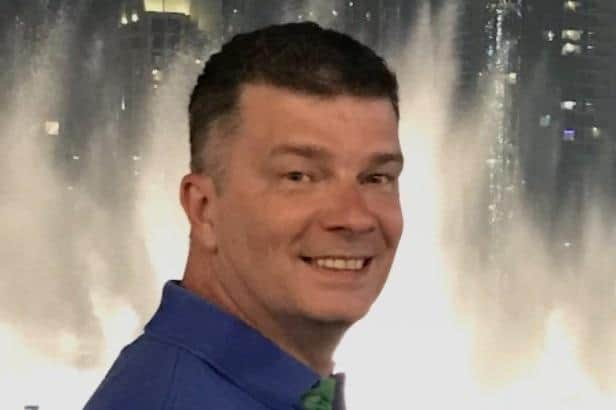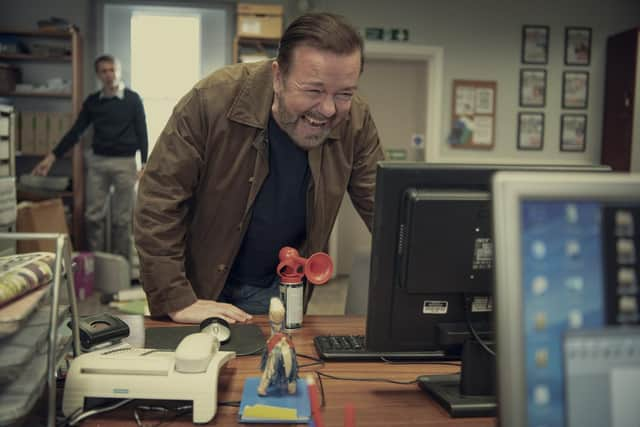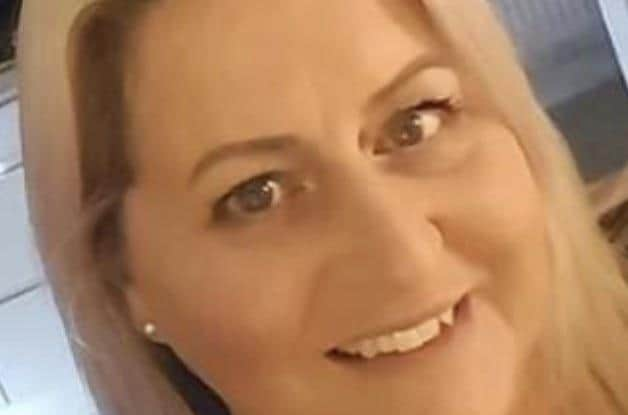Netflix show After Life 'relatable' for Wigan mum helping others with grief and loss
and live on Freeview channel 276
But for some, the story will feel especially close to home.
It is a series which has certainly caught the attention of Jane Dixon, from Hindley Green, who had to adapt to life as a widow when her husband Steve died in 2018.


She managed to get help from fellow members of support group Widowed and Young (WAY), who have been watching the show.
Advertisement
Hide AdAdvertisement
Hide AdJane, 49, said: “The only help I found was through WAY. It has been an absolute lifeline for me and many people I know.
“People talk about After Life a lot because in the programme Ricky Gervais is a widow and he deals with it really sensitively, with lots of laughter and lots of tears, finding humour in the darkness if you like. There are lots of triggers in it and it can set you off crying, because he can show the desperation you feel.
“I don’t know where he got the ideas from, but it was definitely relatable.”


While coming to terms with her own loss, Jane decided she wanted to help others deal with bereavement.
Advertisement
Hide AdAdvertisement
Hide AdShe launched a bereavement service with Bolton Lads’ and Girls’ Club in 2019, which provides support for young people who are grieving.
Jane has since set up bereavement cafes in Bolton, which is a pop-up service in different coffee shops where people can go along for a drink, chat about bereavement or loss and get support from other grieving people.
She said: “I found that’s what helped me the most, talking to others in a similar situation. As time goes on, you don’t want to burden people.”


The bereavement cafes have been well-received and Jane hopes they could be held in Wigan next and then across the rest of Greater Manchester.
Advertisement
Hide AdAdvertisement
Hide AdShe said: “I will looking out for some coffee shops that I can go to. I literally just turn up with banners and leaflets and, depending on the size of the venue, maybe between three and five volunteers. We are not professionals or counsellors or therapists, we are the same as everybody else. We have all been through a loss and grieving and we have an ear to listen to people.”
Jane has done grief recovery training so she can help others and is now a certified grief and recovery specialist, as well as being certified to help children with loss.
She helps to train people who work with children so they can support them through any grief or loss, whether that is a death, family separation, relocation or other situation.
Jane said: “I love it, I absolutely love it. I have done quite a few sessions with different schools where they put five or six teachers through the course.
Advertisement
Hide AdAdvertisement
Hide Ad“It gave them the tools so they could work with children in their care.
“It’s not just for teachers though, I have had parents, counsellors, nurses and foster carers.”
One of the things she feels passionately about is that teachers need to be aware if a pupil has lost a loved one, even if it was some time earlier, as the support they need may be ongoing or could spring up unexpectedly.
She believes it is vital that people get support for loss, particularly children, as it can lead to a wide range of problems, such as bad behaviour, poor choices, depression, anxiety, self-harm and suicidal thoughts,
Advertisement
Hide AdAdvertisement
Hide AdShe said: “I know a lot of the bereavement services out there are just for bereavement, but this is grief and loss, which throws things wide open. A lot of people don’t realise what they are grieving.
“It’s constantly adding layers to your feelings inside and it educates people on how they can identify the grief that’s inside and how they can help to work through it.”
In future she hopes to work with other professional services to help those dealing with loss.
This could be by running courses or through practical advice, such as by supporting a dad who does not know how to plait his daughter’s hair after the death of her mother or by helping a woman who was a stay-at-home mum get into work after the loss of her husband.
Advertisement
Hide AdAdvertisement
Hide AdTraining to help other people has been “quite therapeutic” for Jane and she was also given the opportunity to consider her own grief.
“Before they license you and train you to work with other people through their grief, you have to work through your own,” she said.
“I have had it all done on me and I feel so much clearer from it.
“It doesn’t mean I am over the death of my husband or moved on from it, but it has helped me work through some feelings and emotions that were causing me a lot of pain and helped me to identify them and work on removing them.”
Advertisement
Hide AdAdvertisement
Hide AdJane says she wishes this kind of support had been available to her when her husband died, as the only help she could find was through WAY.
She said: “They are a national charity with a really supportive Facebook group.
“That’s where peer-to-peer support comes in. Being able to talk in a safe place with people who know what you are going through or who will sit with you if you have a bad day, albeit online. There is always someone there.”
While there is a £25 annual fee to join WAY, donations can be made for people unable to afford that so they can still get help. Jane raised money to cover the cost of several memberships at Christmas.
Thanks for reading. If you value what we do and are able to support us, a digital subscription is just £1 for your first month. Try us today by clicking here
